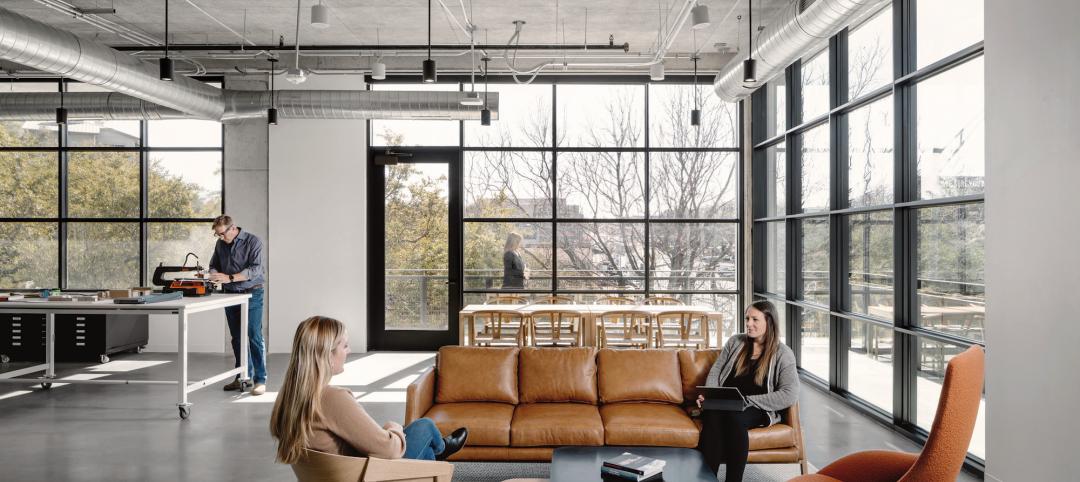Founded in 2009 with an initial endowment of $1.9 million, HMC’s nonprofit Designing Futures Foundation (DFF) has donated about $230,000 in its three years of existence, including $105,000 in scholarships to California students. The grants help promising high schoolers with an interest in architecture, design, engineering, education, or healthcare pay for expenses like test preparation services, computers, and college entrance exam fees and tuition. The scholarships can be extended for up to five years of college.
Executive Director Adrienne Luce says the foundation serves as an extension of HMC’s social responsibility. The DFF’s Community Project initiative provides grants of up to $10,000 to HMC employees for projects for that benefit the communities in which they live and work.
For example, three HMC employees—Pablo La Roche, PhD, LEED AP, Sustainable Design Director; Eera Babtiwale, LEED AP BD+C, Environmental Analyst; and Sandy Kate, REFP, LEED AP, Associate Principal/Senior Education Facilities Planner—proposed a sustainability education program at McKinley Elementary School in Santa Monica. The DFF sponsored nine workshops for 220 McKinley students in grades 3-5 over three days, providing 13½ hours of instruction on energy, water, and waste.
The DFF has funded scholarship programs at Ramona High School, a healthcare academy in Riverside, Calif., and at the Center for Advanced Research and Technology, in Fresno. The DFF also supports Bright Prospect, a college access and retention program in Pomona, and hosted a career day for students aspiring to become architects, engineers, or designers, topped off by a tour of the Ontario office.
Scott Plante, AIA, LEED AP, Senior Project Designer, won a $7,500 DFF grant to help restore the historic Micheltorena Steps in Silver Lake, the vintage 1920s-LA neighborhood where he lives. “The steps are on a main route to the school, and they’re in a state of disrepair,” says Plante, who serves on the Silver Lake Urban Design Committee. The $24,000 project, with donations from the DFF, the Silver Lake Neighborhood Council, and the Safe Routes to Schools program, plus a lighting upgrade by the local water and power utility, will be completed in two phases starting next June.
See the video about the DFF and the Micheltorena Steps project at: www.BDCnetwork.com/HMC/DFF.
At the university level, the Designing Futures Foundation has:
- Provided a $10,000 seed grant to help Cal Poly Pomona start a healthcare architecture studio, the first of its kind west of the Mississippi.
- Worked with Harvey Mudd College and the California Institute of the Arts on a project that uses online games and resources to foster greater environmental responsibility among college students.
- Funded an $18,000 water demonstration garden at Norco College, a two-year institution in Riverside.
- Sponsored research by HMC staff and consulting experts at UC San Diego’s Calit2 StarCAVE virtual reality environment on the effects of the built environment on building users. +
Related Stories
Adaptive Reuse | Jul 27, 2023
Number of U.S. adaptive reuse projects jumps to 122,000 from 77,000
The number of adaptive reuse projects in the pipeline grew to a record 122,000 in 2023 from 77,000 registered last year, according to RentCafe’s annual Adaptive Reuse Report. Of the 122,000 apartments currently undergoing conversion, 45,000 are the result of office repurposing, representing 37% of the total, followed by hotels (23% of future projects).
Hotel Facilities | Jul 26, 2023
Hospitality building construction costs for 2023
Data from Gordian breaks down the average cost per square foot for 15-story hotels, restaurants, fast food restaurants, and movie theaters across 10 U.S. cities: Boston, Chicago, Las Vegas, Los Angeles, Miami, New Orleans, New York, Phoenix, Seattle, and Washington, D.C.
Sustainability | Jul 26, 2023
Carbon Neutrality at HKS, with Rand Ekman, Chief Sustainability Officer
Rand Ekman, Chief Sustainability Officer at HKS Inc., discusses the firm's decarbonization strategy and carbon footprint assessment.
Sports and Recreational Facilities | Jul 26, 2023
10 ways public aquatic centers and recreation centers benefit community health
A new report from HMC Architects explores the critical role aquatic centers and recreation centers play in society and how they can make a lasting, positive impact on the people they serve.
Multifamily Housing | Jul 25, 2023
San Francisco seeks proposals for adaptive reuse of underutilized downtown office buildings
The City of San Francisco released a Request For Interest to identify office building conversions that city officials could help expedite with zoning changes, regulatory measures, and financial incentives.
Designers | Jul 25, 2023
The latest 'five in focus' healthcare interior design trends
HMC Architects’ Five in Focus blog series explores the latest trends, ideas, and innovations shaping the future of healthcare design.
Urban Planning | Jul 24, 2023
New York’s new ‘czar of public space’ ramps up pedestrian and bike-friendly projects
Having made considerable strides to make streets more accessible to pedestrians and bikers in recent years, New York City is continuing to build on that momentum. Ya-Ting Liu, the city’s first public realm officer, is shepherding $375 million in funding earmarked for projects intended to make the city more environmentally friendly and boost quality of life.
Market Data | Jul 24, 2023
Leading economists call for 2% increase in building construction spending in 2024
Following a 19.7% surge in spending for commercial, institutional, and industrial buildings in 2023, leading construction industry economists expect spending growth to come back to earth in 2024, according to the July 2023 AIA Consensus Construction Forecast Panel.
Hotel Facilities | Jul 21, 2023
In Phoenix, a former motel transforms into a boutique hotel with a midcentury vibe
The Egyptian Motor Hotel’s 48 guest rooms come with midcentury furnishings ranging from egg chairs to Bluetooth speakers that look like Marshall amplifiers.
Office Buildings | Jul 20, 2023
The co-worker as the new office amenity
Incentivizing, rather than mandating the return to the office, is the key to bringing back happy employees that want to work from the office. Spaces that are designed and curated for human-centric experiences will attract employees back into the workplace, and in turn, make office buildings thrive once again. Perkins&Will’s Wyatt Frantom offers a macro to micro view of the office market and the impact of employees on the future of work.

















